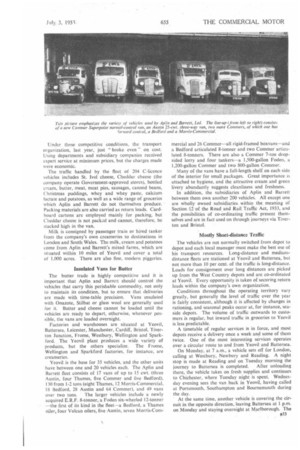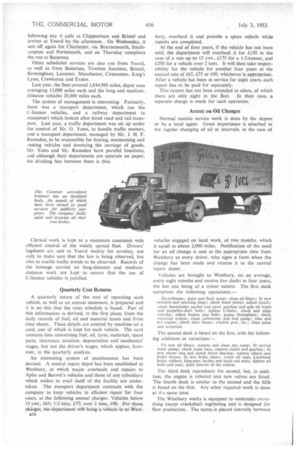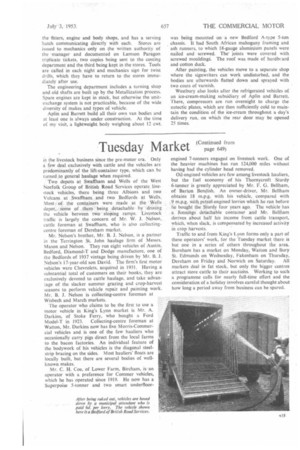Under these competitive conditions, the transport organization, last year, just
Page 91

Page 92

Page 93

If you've noticed an error in this article please click here to report it so we can fix it.
"broke even" on cost. Using departments and subsidiary companies received expert service at minimum prices, but the charges made were economic.
The traffic handled by the fleet of 204 C-licence vehicles includes St. Ivel cheese, Cheddar cheese (the company operate Government-approved stores), bottled cream, butter, meat, meat pies, sausages, canned beans, Christmas puddings, whey and whey paste, calcium lactate and potatoes, as well as a wide range of groceries which Aplin and Barrett do not themselves produce. Packing materials are also carried as return loads. Cardboard cartons are employed mainly for packing, but Cheddar cheese is not packed and cannot, therefore, be stacked high in the van.
Milk is consigned by passenger train or hired tanker from the company's own creameries to destinations in London and South Wales. The milk, cream and potatoes come from Aplin and Barrett's mixed farms, which are situated within 10 miles of Yeovil and cover a total of 1,000 acres. There are also fine, modern piggeries.
Insulated Vans for Butter The butter trade is highly competitive and it is important that Aplin and Barrett should control the vehicles that carry this perishable commodity, not only to maintain its condition, but to ensure that deliveries are made with time-table precision. Vans insulated with Onazote, Stilbat or glass wool are generally used for it. Butter and cheese cannot be loaded until the vehicles are ready to depart, otherwise, whenever possible, the vans are loaded overnight.
Factories and warehouses are situated at Yeovil, Battersea, Leicester, Manchester, Cardiff, Bristol, Tiverton Junction, Frome, Westbury, Wellington and Sparkford. The Yeovil plant produces a wide variety of products, but the others specialize. The Frome, Wellington and Sparkford factories, for instance, are creameries.
Yeovil is the base for 35 vehicles, and the other units have between one and 20 vehicles each. The Aplin and Barrett fleet consists of 17 vans of up to 15 cwt. (three Austin, four Thames, five Commer and live Bedford), 130 from 1-2 tons (eight Thames, 12 Morris-Commercial, 18 Bedford, 28 Austin and 64 Commer). and 49 vans over two tons. The larger vehicles include a newly acquired E.R.F. 8-tonner, a Foden six-wheeled 12-tonner —the first of its kind in the fleet—a Bedford, a Thames oiler, four Vulcan oilers, five Austin, seven Morris-Com mercial and 26 Commer—all rigid-framed boxvans—and a Bedford articulated 8-tonner and two Commer articulated 8-tanners. There are also a Commer 7-ton drop. sided lorry and four tankers—a 1,500-gallon Foden, 1,200-gallon Commer and two 800-gallon Cornmer.
Many of the vans have a full-length shelf on each side of the interior for small packages. Great importance is attached to hygiene, and the attractive cream and green livery abundantly suggests cleanliness and freshness.
In addition, the subsidiaries of Aplin and Barrett between them own another 200 vehicles. All except one are wholly owned subsidiaries, within the meaning of Section 12 of the Road and Rail Traffic Act, 1933, and the possibilities of co-ordinating traffic present themselves and are in fact used on through journeys via Tiverton and Bristol.
Mostly Short-distance Traffic The vehicles are not normally switched from depot to depot and each local manager must make the best use of his transport resources. Long-distance and mediumdistance fleets are stationed at Yeovil and Battersea, but not more than 10 per cent. of the traffic is long-distance. Loads for consignment over long distances are picked up from the West Country depots and are co-ordinated at Yeovil. Every opportunity is taken of securing return loads within the company's own organization.
Conditions throughout the operating territory vary greatly, but generally the level of traffic over the year is fairly consistent, although it is affected by changes in rationing, and seasonal peaks occur at, for instance, seaside depots. The volume of traffic outwards to customers is regular, but inward traffic in groceries to Yeovil is less predictable.
A timetable of regular services is in force, and most depots receive a delivery once a week and some of them twice. One of the most interesting services operates over a circular route to and from Yeovil and Battersea.
On Monday, at 7 a.m., a vehicle sets off for London, calling at Westbury, Newbury and Reading. A night stop is made at Reading and on Tuesday morning the journey to Battersea is completed. After unloading there, the vehicle takes on fresh supplies and continues to Chichester, where Tuesday night is spent. Wednesday evening sees the van back in Yeovil, having called at Portsmouth, Southampton and Bournemouth during the day.
At the same time, another vehicle is covering the circuit in the opposite direction, leaving Battersea at 1 p.m. on Monday and staying overnight at Marlborough. The B33
following day it calls at Chippenham and Bristol and arrives at Yeovil by the afternoon. On Wednesday, it sets off again for Chichester, via Bournemouth, Southampton and Portsmouth, and on Thursday completes the run to Battersea.
Other scheduled services are also run from Yeovil, as well as from Battersea, Tiverton Junction, Bristol, Birmingham, Leicester, Manchester, Cirencester, King's Lynn, Crewkerne and Exeter.
Last year, the fleet covered 1,844,980 miles, depot vans averaging 13,000 miles each and the long and mediumdistance vehicles 20,000 miles each.
The system of management is interesting. Formerly, there was a transport department, which ran the C-licence vehicles, and a railway department (a misnomer) which looked after hired road and rail transport. Last year, a traffic department was set up under the control of Mr. G. Yates, to handle traffic matters, and a transport department, managed by Mr. J. H. F. Ramsden, to be responsible for buying, maintaining and costing vehicles and invoicing the carriage of goods. Mr. Yates and Mr. Ramsden have parallel functions, dnd although their departments are separate on paper. the dividing line between them is thin.
Clerical work is kept to a minimum consistent with efficient control of the widely spread fleet. Drivers' logsheets are sent to Yeovil weekly for scrutiny, not only to make sure that the law is being observed, but also to enable traffic trends to be observed. Records of the tonnage carried on long-distance and mediumdistance work are kept to ensure that the use of C-licence vehicles is justified.
Quarterly Cost Returns
A quarterly return of the cost of operating each vehicle, as well as an annual statement, is prepared and it is on this that the rates schedule is based. Part of this information is derived, in the first place, from the daily records of fuel, oil and material issues and from time sheets. These details are entered by machine on a card, one of which is kept for each vehicle. The card contains data concerning fuel, oil, tyres, materials, spare parts, insurance, taxation, depreciation and mechanics' wages, but not the driver's wages, which appear, however, in the quarterly analysis.
An interesting system of maintenance has been devised. A central repair depot has been established at Westbury, at which major overhauls and repairs to Aplin and Barrett's vehicles and those of any subsidiary which wishes to avail itself of the facility are undertaken. The transport department contracts with the company to keep vehicles in efficient repair for four years. at the following, annual charges: Vehicles below 15 cwt., /65; 1-2 tons, £75; over 2 tons, £90. For those charges, the department wilt bring a vehicle in to West
a34 bury, overhaul it and provide a spare vehicle while repairs are completed.
At the end of four years, if the vehicle has not been sold, the department will overhaul it for £150 in the case of a van up to 15 cwt., £175 for a 1-2-tonner, and £200 for a vehicle over 2 tons. It will then take responsibility for the vehicle for another four years at the annual rate of £65, £75 or £90, whichever is appropriate. After a vehicle has been in service for eight years, each repair has to be paid for separately.
This system has not been extended to oilers, of which
there are only eight in the fleet. In their case, a separate charge is made for each operation.
Accent on Oil Changes
Normal routine service work is done by the depots or by a local agent. Great importance is attached to the regular changing of oil at intervals, in the case of vehicles engaged on local work, of two months, which is equal to about 2,000 miles. Notification of the need for an oil change is sent at the appropriate time from Westbury to every driver, who signs a form when the change has been made and returns it to the central repair depot.
Vehicles are brought to Westbury, on an average, every eight months and receive five docks in four years, the last one being of a minor nature. The first dock comprises the following operations:—
Des:arbonize; drain and flush sump; clean oil filters; fit new contacts and sparking plugs; check water pump; adjust clutch; check hand-brake ratchet and pawl, gearbox and axle oil levels and propeller-shaft bolts; tighten U-bolts; check and align srecring; adjust brakes and hubs; grease throughout; check electrical system; clean carburetter and fuel pump; time and test engine; check door hinges, window gear, etc.; clean paint and revarnish.
The second dock is based on the first, with the following additions or variations:—
Fit new oil filters; remove and clean out sump; fit service water pump; check water hose, remove clutch and gearbox; lit new starter ring and clutch thrust bearing; remove wheels and brake drums; fit new brake shoes; renew oil seals, Lockheed brake rubber's, king-pins, bushes and track-rod ends; tighten all bolts and nuts; paint interior of the vehicle.
The third dock reproduces the second, but, in addition, the engine is rebored and new valves are fitted. The fourth dock is similar to the second and the fifth is based on the first. Any other required work is done at th?, same time.
The Westbury works is equipped to undertake everything except crankshaft regrinding and is designed for flow production. The stores is placed centrally between
the -fitters, engine and body shops, and has a serving hatch communicating directly with each. Stores are issued to mechanics only on the written authority of the -manager and documented on Lamson Paragon triplicate tickets, two copies being sent to the costing department and the third being kept in the stores. Tools are called in each night and mechanics sign for twist drills, which they have to return to the stores immediately after use.
The engineering department includes a turning shop and old shafts are built up by the Metallization process. Spare engines are kept in stock, but otherwise the unitexchange system is not practicable, because of the wide diversity of makes and types of vehicle.
Aplin and Barrett build all their own van bodies and at least one is always under construction. At the time of my visit, a lightweight body weighing about 12 cwt. was being mounted on a new Bedford A-type 5-ton chassis. It had South African mahogany framing and ash runners, to which 18-gauge aluminium panels were nailed and screwed. The joints were covered with screwed mouldingg. The roof was made of hardbcard and cotton duck.
After painting, the vehicles move to a separate shop where the signwriters can work undisturbed, and the bodies are afterwards flatted down and sprayed with two coats of varnish.
Westbury also looks after the refrigerated vehicles of an ice-cream-making subsidiary of Aplin and Barrett. There, compressors are run overnight to charge the eutectic plates, which are then sufficiently cold to maintain the condition of the ice-cream throughout a day's delivery run, on which the rear door may be opened 25 times.




























































































































































